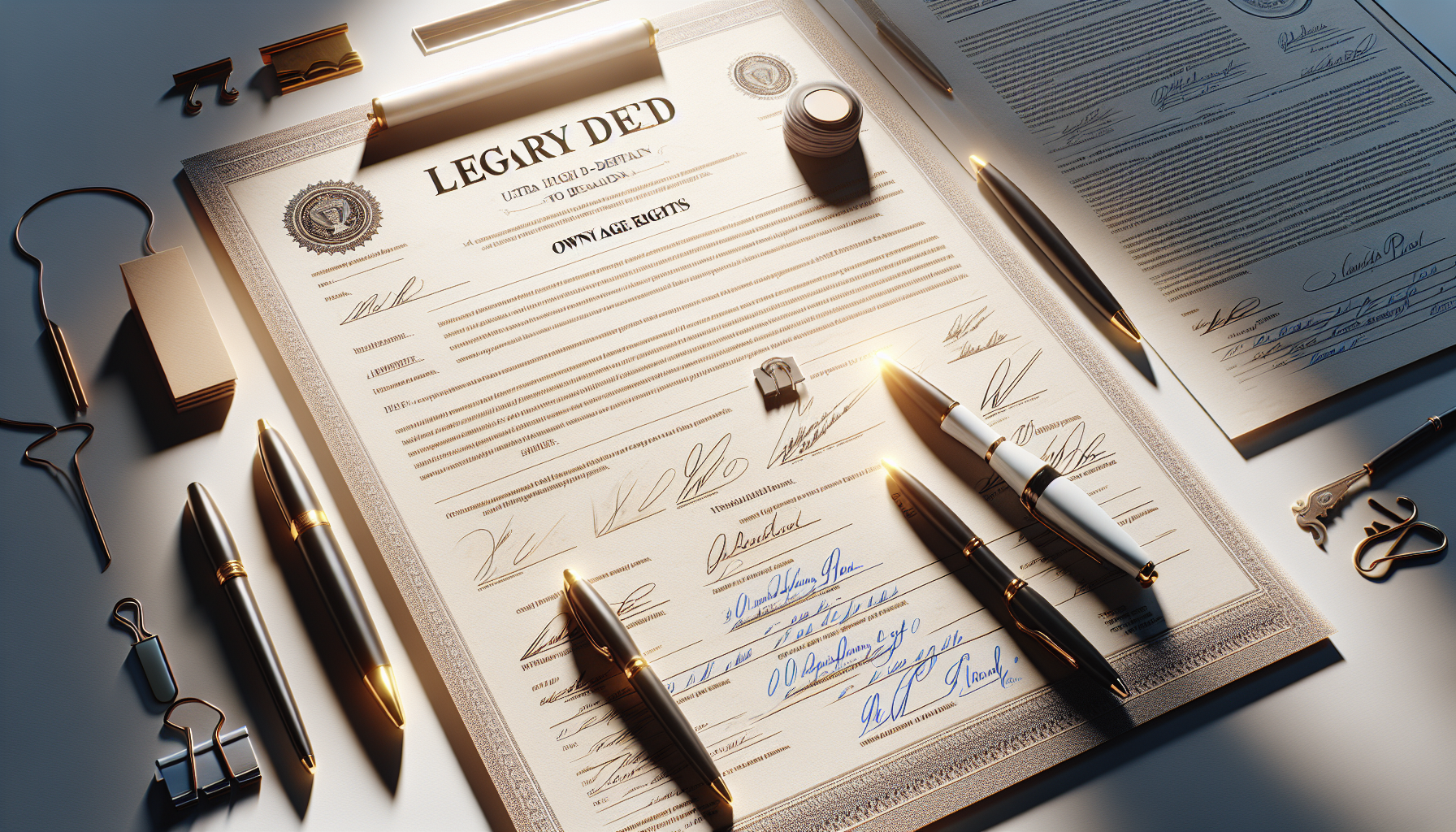Understanding the Difference Between a Deed and a Mortgage
When purchasing a home, two essential legal documents come into play: the house deed and the mortgage. Although often used interchangeably, these documents serve different purposes and confer distinct rights and obligations upon the parties involved. Understanding the difference between a deed and a mortgage is crucial for homeowners, especially in situations where one’s name appears on the deed but not the mortgage.
A house deed is a legal document that proves ownership of a property. It outlines the transfer of title rights from the grantor (the current owner) to the grantee (the new owner). The deed includes a description of the property, the names of the grantor and grantee, and any restrictions or easements associated with the property. Various types of deeds exist, such as warranty deeds used in traditional home sales and quitclaim deeds often used for transferring property between family members.
What Is a House Deed?
A house deed is a legal document that serves as proof of ownership for a specific property. It grants the titleholder certain rights, such as the ability to sell, lease, or transfer the property. The deed contains crucial information, including a detailed description of the property, the names of the grantor (the person transferring ownership) and the grantee (the person receiving ownership), and any easements or restrictions associated with the property.
There are several types of house deeds, each serving a different purpose. For instance, a warranty deed is commonly used in traditional home sales and offers certain guarantees and protections to the buyer. On the other hand, a quitclaim deed is often used when transferring property between family members or as part of an estate plan, as it conveys whatever interest the grantor has in the property without making any warranties.
What Is a Mortgage?
A mortgage, on the other hand, is a financial agreement between a lender and a borrower. When purchasing a home, most buyers require financing from a bank or other financial institution. The mortgage acts as a security instrument, giving the lender a legal claim against the property until the loan is repaid in full. The borrower, in turn, agrees to make regular payments to the lender, typically including principal and interest, until the mortgage is satisfied.
Unlike a deed, which establishes ownership, a mortgage represents a financial obligation tied to the property. The borrower retains ownership of the home but must comply with the terms of the mortgage agreement, such as making timely payments and maintaining adequate insurance coverage. Failure to meet these obligations can result in the lender initiating foreclosure proceedings to recover the outstanding debt.
Why a Deed Is More Important Than a Mortgage
While both the deed and mortgage are essential documents in a home purchase transaction, the deed holds greater importance in establishing ownership rights. The deed legally proves that the titleholder owns the property, granting them the authority to make decisions regarding its use and disposition. Even if an individual’s name is not on the mortgage, being named on the deed confers certain rights and protections.
In situations where one party is on the deed but not the mortgage, they still retain an ownership interest in the property. This can occur in various scenarios, such as when a home is purchased with cash, received as a gift, or transferred through an estate. The absence of a mortgage in these cases does not diminish the ownership rights granted by the deed.
Rights Associated With Being on a Deed But Not a Mortgage
Being named on a property deed without being on the mortgage can occur under various circumstances, such as when a home is purchased with cash, received as a gift, or transferred through an estate. In these situations, the individual on the deed maintains certain rights and protections, even in the absence of a mortgage obligation.
One of the primary advantages of being on the deed but not the mortgage is the ability to enjoy ownership benefits without the financial responsibility of monthly mortgage payments. This arrangement can be particularly advantageous for those who have received the property as a gift or inheritance, as they gain the security and potential appreciation of homeownership without the burden of a long-term debt obligation.
Ownership Rights Without Mortgage Responsibility
When an individual is named on the deed but not the mortgage, they retain full ownership rights to the property. These rights include the ability to occupy, rent, sell, or transfer the home as they see fit. As a legal owner, they are entitled to any appreciation in the property’s value over time and can make decisions regarding its use and improvement without the need for approval from a mortgage lender.
However, it is essential to note that being on the deed without a mortgage does not entirely eliminate financial obligations. Property taxes, insurance, and maintenance costs are still the responsibility of the homeowner, regardless of whether they have a mortgage. Failing to pay property taxes can lead to liens or even foreclosure, making it crucial for deed holders to stay current on these expenses.
Scenarios Where You’re on the Deed But Not the Mortgage
There are several common scenarios in which an individual may find themselves on the deed to a property but not on the mortgage:
- Cash purchase: When a home is purchased entirely with cash, there is no need for a mortgage. In this case, the buyer’s name appears on the deed as the sole owner, without any accompanying mortgage obligations.
- Gift or inheritance: If a property is gifted or inherited, the recipient’s name is added to the deed, granting them ownership rights. However, if the property has an existing mortgage, the recipient does not automatically assume responsibility for that debt unless they choose to do so.
- Divorce settlements: In some divorce cases, one spouse may be granted ownership of the marital home through a quitclaim deed while the other spouse remains solely responsible for the mortgage. This arrangement can be complex and requires careful legal and financial planning to ensure the protection of both parties’ interests.
Protecting Your Interests When on a Deed But Not a Mortgage
To safeguard your interests as a deed holder without mortgage responsibilities, it is crucial to establish clear agreements and understandings with any other parties involved in the ownership of the property. This is particularly important in situations where multiple individuals share ownership, such as in the case of joint tenancy or tenancy in common.
Creating a written agreement that outlines each party’s rights, responsibilities, and obligations can help prevent future disputes and misunderstandings. This agreement should address issues such as property maintenance, tax payments, and the division of proceeds in the event of a sale. By formalizing these arrangements, all parties can ensure their interests are protected and minimize the risk of costly legal battles down the road.
Implications of Modifying a Deed When a Mortgage Exists
While being on the deed but not the mortgage can offer certain advantages, it is essential to understand the potential implications of modifying a deed when a mortgage is already in place. Most mortgage agreements include a “due on sale” or “due on transfer” clause, which allows the lender to demand full repayment of the loan if the property ownership changes hands without their approval.
This means that adding or removing names from a deed when a mortgage exists can trigger serious consequences, such as the acceleration of the loan and the requirement to pay off the entire outstanding balance immediately. Failing to comply with these demands can result in the lender initiating foreclosure proceedings, putting the property and the financial well-being of all parties involved at risk.
Adding or Removing Names From a Deed With a Mortgage
In some cases, homeowners may wish to add or remove names from a property deed while a mortgage is still in effect. This can occur for various reasons, such as marriage, divorce, estate planning, or changes in personal relationships. However, it is crucial to approach these situations with caution and seek the guidance of legal and financial professionals.
One common method for modifying a deed is through the use of a quitclaim deed. This type of deed allows the current owner (the grantor) to transfer their interest in the property to another party (the grantee) without making any warranties or guarantees about the title. While a quitclaim deed can effectively add or remove names from the deed, it does not release any party from their obligations under the existing mortgage.
Triggering the Due on Transfer Clause
Most mortgage contracts contain a “due on transfer” clause, also known as a “due on sale” clause. This provision allows the lender to demand full repayment of the outstanding loan balance if the property ownership is transferred without their consent. The purpose of this clause is to protect the lender’s interests and ensure that the original borrower remains responsible for the debt.
When a deed is modified to add or remove names, it can trigger the due on transfer clause, even if the original borrower remains on the mortgage. This is because the lender views any change in ownership as a potential risk to their investment. If the due on transfer clause is invoked, the borrower may be required to pay off the entire mortgage balance in a short period, which can be a significant financial burden.
| Scenario | Potential Consequences |
|---|---|
| Adding a spouse to the deed after marriage | Lender may invoke due on transfer clause |
| Removing an ex-spouse from the deed after divorce | Lender may require refinancing or loan assumption |
| Transferring ownership to a trust for estate planning | Lender may demand full repayment of the mortgage |
Consulting With Your Mortgage Lender Before Modifying a Deed
To avoid unintended consequences and protect your financial interests, it is essential to consult with your mortgage lender before making any changes to a property deed. Lenders may be willing to work with borrowers in certain situations, such as adding a spouse to the deed after marriage or removing an ex-spouse following a divorce. However, their approval is not guaranteed and may come with additional requirements or fees.
When discussing potential deed modifications with your lender, be prepared to provide documentation and explain the reasons behind the proposed changes. The lender will assess the risk associated with the transfer and determine whether it aligns with their policies and guidelines. If the lender agrees to the modification, they may require the new deed holder to assume the mortgage or refinance the loan to reflect the updated ownership structure.
Navigating the legal and financial complexities of being on a deed but not a mortgage can be challenging, particularly when disputes or ownership changes arise. To protect your interests and ensure a smooth resolution, it is essential to seek the guidance of experienced professionals who can provide tailored advice based on your unique circumstances.
Real estate attorneys and financial advisors can offer valuable insights and help you understand your rights and obligations as a deed holder. They can also assist in drafting legally enforceable agreements, navigating mortgage lender requirements, and resolving potential conflicts between co-owners. By working with these experts, you can make informed decisions and take proactive steps to safeguard your investment and minimize the risk of costly legal battles.
The Importance of Seeking Legal Counsel
When dealing with property ownership and deed modifications, it is crucial to seek the advice of a qualified real estate attorney. Laws governing property rights and transactions vary by state, and an experienced attorney can help you understand the specific legal requirements and implications in your jurisdiction. They can review your unique situation, identify potential risks or challenges, and recommend the most appropriate course of action to protect your interests.
An attorney can also assist in drafting or reviewing legal documents, such as quitclaim deeds, coownership agreements, or mortgage assumption paperwork. They can ensure that these documents are properly executed and legally enforceable, minimizing the risk of future disputes or challenges to your ownership rights. Additionally, an attorney can represent your interests in negotiations with mortgage lenders, co-owners, or other parties involved in the property.
Formalizing Agreements to Protect All Parties
When multiple parties are involved in the ownership of a property, it is essential to establish clear, written agreements that outline each person’s rights, responsibilities, and obligations. These agreements can take the form of coownership contracts, mortgage assumption agreements, or other legally binding documents that address issues such as:
- Ownership percentages and division of equity
- Financial responsibilities for mortgage payments, property taxes, insurance, and maintenance
- Procedures for buying out another owner’s interest or selling the property
- Dispute resolution mechanisms and legal remedies in case of disagreements
By formalizing these agreements and having them properly executed and notarized, all parties can ensure that their interests are protected and that there is a clear roadmap for handling potential challenges or changes in circumstances. This can help prevent misunderstandings, minimize the risk of costly legal disputes, and provide peace of mind for everyone involved in the ownership of the property.
Addressing Potential Conflicts and Ownership Disputes
Despite best efforts to establish clear agreements and maintain open communication, conflicts and ownership disputes can still arise when multiple parties are involved in a property. These disputes can stem from disagreements over financial responsibilities, differing opinions on property management or improvements, or changes in personal relationships or circumstances.
When conflicts occur, it is important to address them promptly and professionally to prevent the situation from escalating and causing irreparable damage to the parties’ relationships and financial well-being. In many cases, disputes can be resolved through open dialogue, mediation, or alternative dispute resolution methods that allow the parties to find mutually agreeable solutions without resorting to costly and time-consuming litigation.
However, if informal resolution attempts prove unsuccessful, legal action may be necessary to protect your rights and interests. In such cases, having a strong legal foundation, including properly executed agreements and documentation of your ownership stake, can be invaluable in asserting your claims and achieving a favorable outcome. Working closely with an experienced real estate attorney can help you navigate the legal process, build a compelling case, and seek the appropriate remedies to resolve the dispute and secure your ownership rights.
See also:
- What Happens When You Have Quit Claim Deed, But Still On Mortgage | Explained
- Who Has the Deed to My House If I Have a Mortgage
- What is a Wrap Around Mortgage: Everything You Need To Know
- What Is a Mortgage Clause: Understanding the Basics
- How to Put House in Trust with Mortgage – Step by Step Guide








Leave a Reply